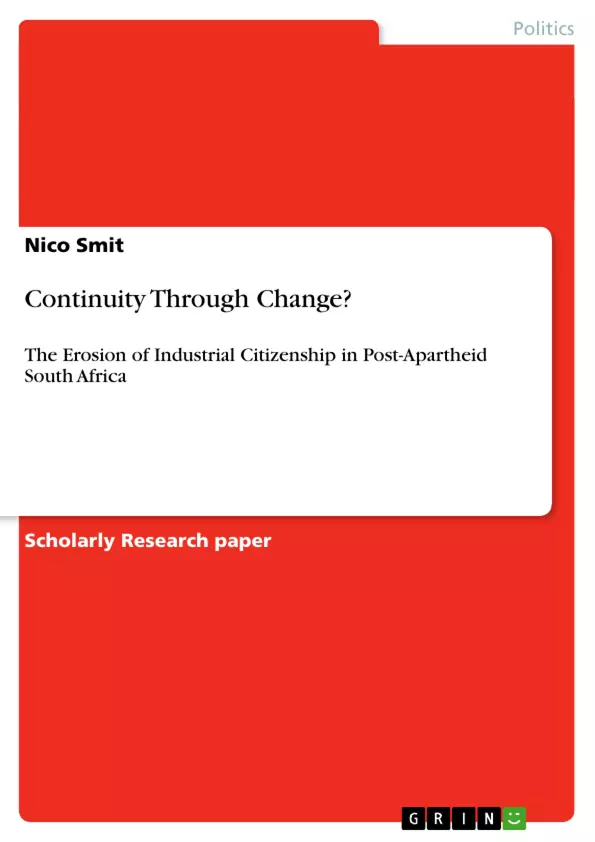Any discussion of industrial citizenship in South Africa is one which requires not only a
focus on the current labour relations dispensation, but which tracks the development of labour
relations in South Africa as it progressed along a winding path, beginning with the import of
trade unionism from Britain in the latter stages of the nineteenth century.1 From the outset
industrial citizenship was not extended to all workers, with race providing the basis for
inclusion and exclusion, and the dual labour relations system was formally crystallized in
1953.2 Under the apartheid regime, labour relations created pattern of inclusion and exclusion
on a racial basis which was swept away in 1979 with the state’s acceptance and
implementation of the recommendations made by the Wiehahn Commission.3 South Africa’s
triple transition has been “accompanied by a process of corporate and workplace
restructuring,”4 engendering new patterns of inclusion and exclusion as South Africa has
entered a globally integrated economy where exclusion is justified on the grounds of cost
reduction and increasing competitiveness.5
This essay aims to make the argument that a large (and growing) portion of the South
African workforce has roughly gone full circle in terms of industrial citizenship – where
under apartheid they were denied labour rights and access to the industrial relations
machinery, they are currently in a situation where the gains won throughout the liberation
struggle and cemented in post-apartheid labour legislation are increasingly being eroded as
they are shifted to a section of the workforce which finds itself beyond the scope of labour
legislation. This paper is divided into four sections, the first providing a discussion of the
dualistic labour relations system. The second section discusses the immediate legislative
reforms effected in the wake of the 1973 Durban strikes, the establishment of the Wiehahn Commission, its recommendations and the effect thereof on labour relations in South Africa.
The third section focuses on the post-apartheid era, and the final section concludes.
Inhaltsverzeichnis (Table of Contents)
- Introduction
- The Dualistic Labour Relations System
- Big Ripples in a Small Pond
- The Post Apartheid Era
- Conclusion
Zielsetzung und Themenschwerpunkte (Objectives and Key Themes)
This essay explores the erosion of industrial citizenship for a large portion of the South African workforce, examining how they were denied labour rights during apartheid and how these gains are being eroded in the post-apartheid era.
- The evolution of labour relations in South Africa, from the introduction of trade unionism to the development of the dualistic labour relations system under apartheid.
- The impact of apartheid on industrial citizenship, particularly the exclusion of black workers from labour rights and the official dispute resolution machinery.
- The post-apartheid era and the emergence of new patterns of inclusion and exclusion in the workplace, driven by factors such as corporate restructuring and globalization.
- The erosion of labour rights and the increasing exclusion of certain segments of the workforce from the benefits of post-apartheid labour legislation.
- The significance of understanding the historical and contemporary dynamics of industrial citizenship in South Africa.
Zusammenfassung der Kapitel (Chapter Summaries)
The first chapter introduces the concept of industrial citizenship in South Africa and outlines the essay's argument. The second chapter explores the historical development of the dualistic labour relations system in South Africa, highlighting the exclusion of black workers from labour rights and the official dispute resolution machinery. This chapter examines the origins of the system, the role of the Industrial Conciliation Act (ICA) of 1924, and the consequences of this legislation for black workers. The third chapter is expected to discuss the period following the 1973 Durban strikes and the implementation of the Wiehahn Commission's recommendations. The fourth chapter focuses on the post-apartheid era and the changing landscape of labour relations. This chapter is likely to explore the impact of corporate restructuring and globalization on industrial citizenship, as well as the new patterns of inclusion and exclusion emerging in the workforce.
Schlüsselwörter (Keywords)
Key terms and concepts in this essay include industrial citizenship, labour relations, apartheid, dualistic labour relations system, black workers, trade unions, Industrial Conciliation Act (ICA), Wiehahn Commission, post-apartheid era, corporate restructuring, globalization, inclusion, exclusion, and the erosion of labour rights.
Frequently Asked Questions
What is industrial citizenship in the South African context?
Industrial citizenship refers to the inclusion of workers in the labor relations system, granting them rights to organize, bargain collectively, and access dispute resolution machinery.
How did apartheid affect labor relations?
Apartheid created a dual labor relations system based on race, where black workers were systematically excluded from formal labor rights and collective bargaining until the late 1970s.
What was the significance of the Wiehahn Commission?
Established in 1979, the Wiehahn Commission recommended the state accept and implement labor rights for all races, effectively ending the formal racial exclusion in industrial relations.
Why is industrial citizenship currently being eroded in South Africa?
The erosion is driven by corporate restructuring, globalization, and cost reduction, which shift workers into segments of the workforce that fall outside the scope of labor legislation.
What role did the Industrial Conciliation Act of 1924 play?
The 1924 Act was a foundational piece of legislation that crystallized the exclusion of black workers from the definition of "employee," denying them formal bargaining power for decades.
- Citation du texte
- Nico Smit (Auteur), 2010, Continuity Through Change?, Munich, GRIN Verlag, https://www.grin.com/document/214621



